January 6, 2021

Mayor Walsh signed an ordinance creating an Office of Police Accountability and Transparency on Monday in his City Hall office. Isabel Leon/Mayor's office photo
Mayor Walsh has signed an ordinance establishing a City Hall office that will give teeth and subpoena powers to a new civilian review panel charged with investigating police misconduct. The Office of Police Accountability and Transparency (OPAT) is the last plank in a three-pronged police reform package devised in response to the police murder of George Floyd in Minneapolis.
The office will provide intake services and investigators to support the nine-member Civilian Review Board and the Internal Affairs Oversight Panel (IAOP), which replaced an earlier board that critics said lacked power to pursue complaints against officers.
“Now is the time to act with urgency to dismantle systemic racism across our city,” Walsh during a signing ceremony on Monday that was streamed online. “The Office of Police Accountability and Transparency will support lasting, generational change by rooting out impropriety and ensuring the type of enhanced oversight that leads to greater community trust. This is an important milestone, but it’s only the beginning.”
A task force appointed by Walsh and led by former US Attorney Wayne Budd recommended the new oversight apparatus last summer. The city has begun a search for an executive director of OPAT, who would be tasked with leading the administrative and office staff.
“The Boston Police Reform Task Force worked diligently to produce a set of recommendations that will create real reform within the Boston Police Department,” said Budd. “Today, by signing this ordinance, the OPAT office, the Civilian Review Board, and the Internal Affairs oversight panel have been established into law. I look forward to seeing how the office enhances equity and allows the community to have greater confidence in the integrity of policing.”
Noted Walsh: “We came back with a response. We’re building on the work that we’ve done here since I became mayor in 2014 through an equity lens. But this was different, and the feeling was about dealing with systemic racism and changing the system that systemic racism exacerbates.”
The task force presented recommendations for reform in October, after hosting community input sessions over the summer. The four main areas of review were: use of force policies; implicit bias training, the Body-worn Camera Program, and the Community Ombudsman Oversight Panel (CO-OP). The creation of the OPAT was a central recommendation from the Task Force.
Walsh has signed ordinances establishing the Civilian Review Board, which will be made up of community members nominated by the City Council and the Mayor’s Office, and the IOAP, which will review the internal affairs policies and procedures, and engage with the community about their impact.
The IOAP will be housed within OPAT, making up a “two-pronged” system with a single point of entry for residents issuing complaints.
It creates what Walsh called “a single point of entry for residents issuing complaints and offers an enhanced and strengthened level of civilian input.”
The mayor added that the task force members have offered their extended assistance to him as advisors as the city “continues to move forward and build trust. We have the best police department in the country, and there’s no reason why anyone should be fearful of what we’re doing today. What we’re doing is adding accountability, whether it’s in training, hiring, diversity, police misconduct.
“We want to make sure we’re doing everything that we can so that people have full faith and trust in the Boston Police Department. We have the opportunity to be a national model, we’re the first city to really respond, and I’m proud of the work that’s been done here and I know we have more work to do,” the mayor said.


